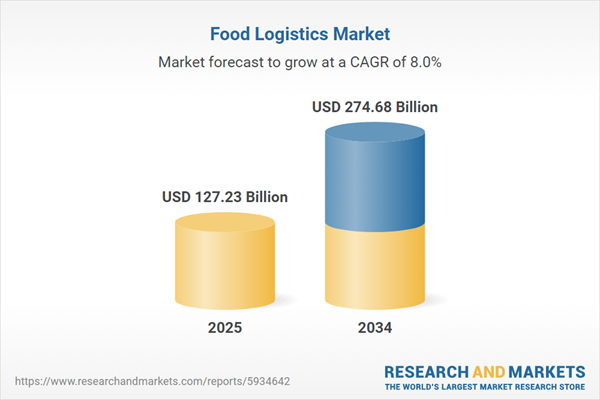Robust Growth of Food and Beverage Industry to Aid the Market Growth
The robust growth in the food and beverage industry is one of the primary reasons for the growth of the food logistics industry. Moreover, the increasing demand for convenience and packaged food is also aiding the industry growth. As food logistics provides the right product and quantity at a low-cost and delivers the product on time, it maintains a continuous supply of products from distributors and suppliers. Also, improving distribution networks and infrastructure in developing countries are further catalysing the market growth.The surging international trade of perishable food and the growing consumer demand for perishable foods is rapidly boosting the cold management chains, the latter is characterised by temperature tracking and monitoring with the help of technology such as Internet of Things (IoT). The rising awareness of prevailing global hunger and food wastage is also leading the growth of the food logistics industry as it aims to reduce food wastage by providing efficient food management. The growing urbanisation and the increasing disposable income have significantly increased the spending on food products, and customers are gradually relying on home delivery, consequently thrusting the food logistics industry.
Food Logistics: Market Segmentation
Logistics is defined as the process of coordinating and moving resources from one location to storage at the desired location. It also involves identifying prospective distributors and suppliers and determining their effectiveness and accessibility. Logistics is crucial in the food industry; it is used to take care of incoming goods, warehousing, order picking, and delivery of finished and semi-finished goods.The major segments of food logistics are:
- Transportation
- Packaging
- Instrumentation
Based on the products, the industry can be segmented into:
- Dairy Products
- Bakery and Confectionary
- Processed Food and Vegetable Oil
- Fish, Meat, And Seafood
- Fruits and Vegetables
- Fruit Pulp and Concentrates
- Coffee and Tea
- Other
The market can be broadly categorised on the basis of its transportation mode into:
- Airway
- Seaway
- Roadway
- Railway
On the basis of service type, the industry is divided into:
- Cold Chain
- Non-Cold Chain
Market breakup by region:
- North America
- Europe
- Asia-Pacific
- Latin America
- Middle East and Africa
Technological Advances to Bolster the Industry Growth of Food Logistics
The increasing internet penetration is one of the key drivers of the market. The rise of e-commerce sectors such as online retail shopping is escalating the market growth. Evolving services owing to high competition is also a significant driver of the market. With the adoption of the latest information technology such as blockchain, big data, system integration, and simulation, the food logistics industry aims to reduce logistic costs and carbon emissions and promote sustainability, further invigorating the market growth. The advent of the Internet of Things (IoT) has redefined the food logistics industry and enables supply chains and logistic companies to trace and track the products conveniently. It also provides business managers with advanced analytics, which not only contributes towards the expansion of the industry but also paves the way for its further development.Moreover, technological advancements like artificial intelligence (AI) increases the efficiency of the food industry, consequently catalysing the market growth. The advent of technological advancements, such as robotics, in the food logistics industry, is providing the required food safety and transparency, and as a result, aiding the market growth. Moreover, evolving food habits, soaring demand for convenience and packaged food, and increasing focus on hygienic foods are contributing significantly to the industry growth. Additionally, increasing customer demands for globalised and imported products are also aiding the industry growth. Furthermore, factors such as shelf life and demographic trends are lubricating the market growth. The rising demand for food safety and transparency in the food and beverage industry is also crucial to the market growth.
Key Industry Players in the Global Food Logistics Market
The report presents a detailed analysis of the following key players in the global food logistics market, looking into their capacity, market shares, and latest developments like capacity expansions, plant turnarounds, and mergers and acquisitions:- AmeriCold Logistics LLC
- Dachser Group SE & Co. KG
- AJC International, Inc
- CJ Logistics Corporation
- C.H. Robinson Worldwide, Inc.
- Matson, Inc.
- Hellmann Worldwide Logistics SE & Co. KG
- Others
Table of Contents
Companies Mentioned
The key companies featured in this Food Logistics market report include:- AmeriCold Logistics LLC
- Dachser Group SE & Co. KG
- AJC International, Inc
- CJ Logistics Corporation
- C.H. Robinson Worldwide, Inc.
- Matson, Inc.
- Hellmann Worldwide Logistics SE & Co. KG
Table Information
| Report Attribute | Details |
|---|---|
| No. of Pages | 162 |
| Published | August 2025 |
| Forecast Period | 2025 - 2034 |
| Estimated Market Value ( USD | $ 127.23 Billion |
| Forecasted Market Value ( USD | $ 274.68 Billion |
| Compound Annual Growth Rate | 8.0% |
| Regions Covered | Global |
| No. of Companies Mentioned | 8 |









